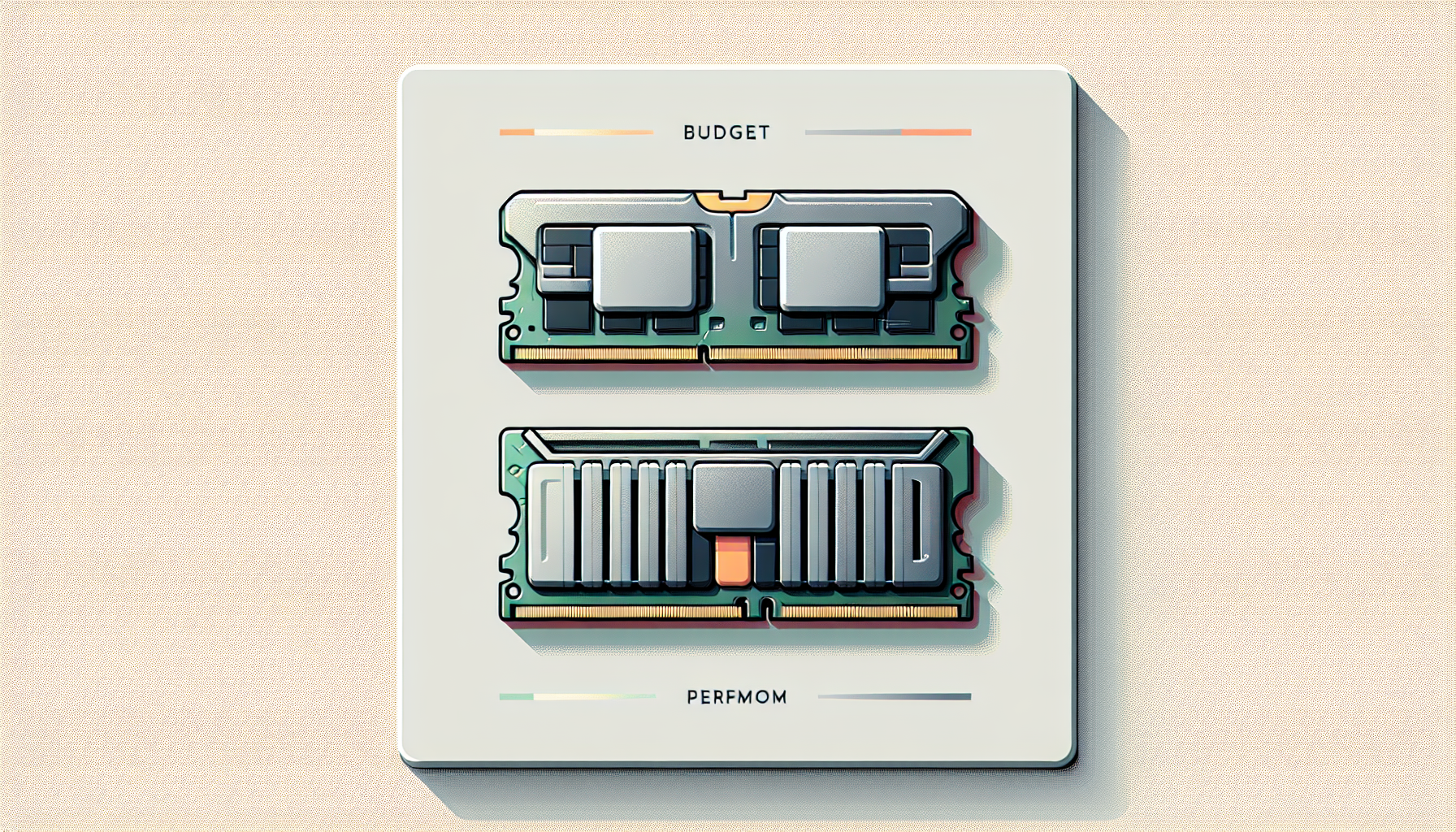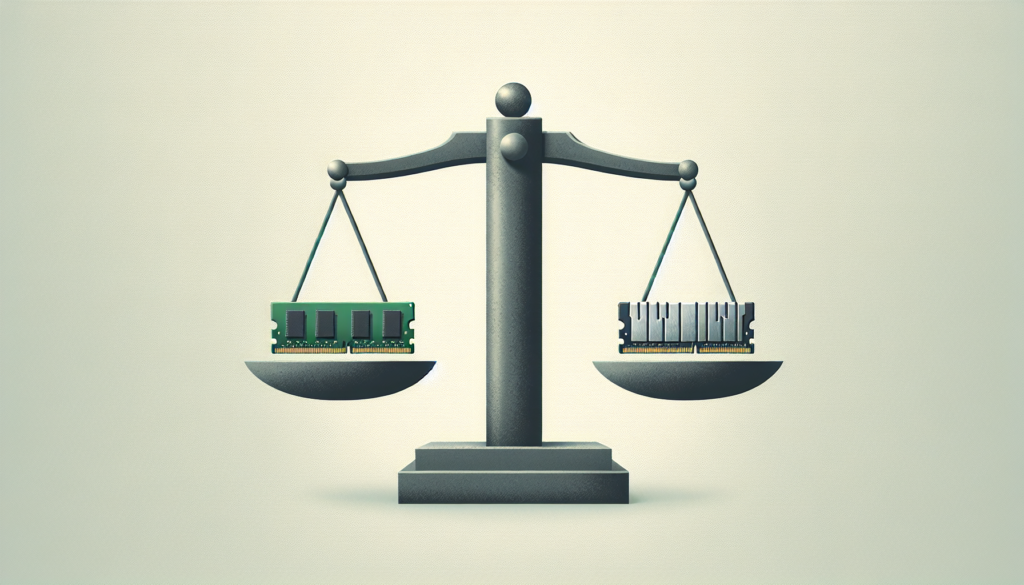When it comes to upgrading your computer’s RAM, one of the most crucial decisions you’ll have to make is whether to go for budget or high-performance options. Both choices offer their own set of advantages and factors to consider. On one hand, budget RAM can be more affordable, making it ideal for those on a tight budget. On the other hand, high-performance RAM can provide a significant boost to your system’s overall performance, especially for demanding tasks such as gaming or video editing. In this article, we’ll explore the key considerations to keep in mind when deciding between these two options, helping you make an informed choice that suits your specific needs.
Performance
Speed
When considering RAM, one important aspect to look at is its speed. The speed of RAM is measured in megahertz (MHz) and indicates how quickly data can be accessed and transferred. Higher speed RAM allows for faster processing tasks, such as loading applications or running intensive software. If you frequently engage in tasks that require quick data access, such as video editing or gaming, it is recommended to opt for RAM with a higher speed.
Latency
In addition to speed, latency is another crucial factor to consider in RAM performance. Latency represents the time it takes for the RAM to respond to a request for stored data. Lower latency means quicker response time and improved overall system performance. For tasks that involve frequent access to stored data, such as multitasking or content creation, RAM with lower latency is more beneficial.
Bandwidth
Bandwidth refers to the amount of data that can be transferred between the RAM and the CPU in a given time frame. It is measured in megabytes per second (MB/s) and determines the overall data-handling capability of the RAM. Higher bandwidth RAM allows for smoother data flow, resulting in better performance for memory-intensive tasks like video rendering or running multiple virtual machines. Consider the bandwidth requirements of your intended usage to ensure optimal performance.
Compatibility
Operating System
When selecting RAM, it is crucial to ensure compatibility with your operating system (OS). Different OS versions may have specific RAM requirements, such as the maximum supported capacity or certain memory types. Consult the documentation or specifications of your OS to determine the compatible RAM options.
Motherboard
The compatibility between RAM and your motherboard is equally important. Different motherboards support specific RAM types, speeds, and capacities. Consult the motherboard manufacturer’s documentation or website to identify the supported RAM modules. It is also essential to note the maximum number of RAM slots available on your motherboard and the maximum amount of RAM it can accommodate.
Other Components
Consider the compatibility of RAM with other components in your system. For instance, certain CPU models may have specific memory requirements, and not all graphics cards are compatible with all RAM configurations. Ensure that your RAM choice is compatible with other key components, such as the CPU and GPU, to avoid potential conflicts or performance issues.
This image is property of images.unsplash.com.
Usage
Basic Tasks
For basic tasks like web browsing, document editing, or casual media consumption, budget RAM options can suffice. These tasks do not typically require extensive memory capabilities or high-speed data access. However, it is still important to select a RAM capacity that meets the minimum requirements of your operating system and software applications.
Gaming
Gaming enthusiasts often require RAM with higher performance to ensure smooth gameplay and reduce lag. Many modern games are memory-intensive, requiring substantial data access and storage capabilities. Opting for higher-speed RAM with lower latency can significantly enhance gaming performance, reducing loading times and improving overall responsiveness.
Content Creation
Content creation tasks, such as video editing, 3D rendering, or audio production, greatly benefit from high-performance RAM. These tasks involve handling large files and complex software applications that demand fast data access and ample memory capacity. Investing in faster RAM with higher bandwidth can significantly improve workflow efficiency and reduce rendering or processing times.
Multitasking
If you frequently engage in multitasking, having sufficient RAM capacity is crucial. Running multiple applications simultaneously, switching between them, or running virtual machines require significant memory resources. To ensure smooth multitasking, opt for RAM with higher capacity to accommodate the memory demands of your multitasking activities.
Budget
Price
Price is a major consideration when choosing RAM. Budget RAM options are generally more affordable compared to high-performance RAM. They provide adequate memory capacity and speed for basic tasks or entry-level gaming. Consider your budgetary constraints and the intended usage of your system when selecting RAM within your price range.
Value for Money
While budget RAM may meet the needs of many users, high-performance RAM offers additional benefits for specific tasks. Evaluating the value for money involves considering your usage requirements and budgetary limitations. If you engage in memory-intensive tasks or prioritize speed and responsiveness, investing in high-performance RAM may provide significant benefits and deliver better long-term value.
This image is property of images.unsplash.com.
Overclocking
Ability to Overclock
Overclocking allows users to increase the clock speed and performance of their RAM beyond its default specifications. Not all RAM modules support overclocking, so if you are interested in pushing your system’s performance to the limits, it is essential to choose RAM with overclocking compatibility. Ensure that the RAM you select explicitly mentions support for overclocking if you plan to engage in this advanced technique.
Stability
When overclocking RAM, stability is a critical concern. Pushing the RAM beyond its default specifications can result in system instability, crashes, or data corruption if not done properly. High-performance RAM is often built with better quality components and undergoes more rigorous testing, making it more stable and reliable during overclocking. If you intend to overclock your RAM, consider investing in high-performance options to ensure stability and minimize potential risks.
Future Upgrades
Expansion Slots
Considering future upgrades is essential to ensure scalability and compatibility for your system. Look at the number of available RAM expansion slots on your motherboard when selecting RAM. If you plan to upgrade your RAM in the future, having additional slots allows for easy expansion without needing to replace existing modules.
RAM Capacity
The maximum RAM capacity that your motherboard can support is an important factor to consider when thinking about future upgrades. While your current usage requirements may be met with a certain capacity, it is wise to choose RAM that allows for future expansion. Opting for higher-capacity RAM ensures that your system remains capable of handling evolving software requirements or increased memory demands.

This image is property of images.unsplash.com.
Reliability
Brand Reputation
Considering the reputation of the RAM manufacturer is important, as it reflects the level of quality and support you can expect. Established brands with a good reputation often have a proven track record in producing reliable and stable RAM modules. Research reviews and user experiences to gain insights into the reliability and longevity of RAM from different manufacturers.
Warranty
The warranty offered by the RAM manufacturer is an additional factor to consider. A longer warranty period indicates the confidence that the manufacturer has in their product’s reliability. Look for RAM with a warranty that provides reasonable coverage, as it serves as a form of assurance against potential defects or failures.
Heat Generation
Thermal Dissipation
RAM modules generate heat during operation, and efficient heat dissipation is crucial for optimal performance and longevity. RAM modules with effective heat spreaders or heat sinks help dissipate heat more efficiently, preventing overheating and potential performance degradation. When selecting RAM, consider modules that incorporate heat dissipation features to ensure stable performance and longevity, especially if you engage in memory-intensive tasks or overclocking.

Power Consumption
Energy Efficiency
Power consumption is an important consideration, particularly for those aiming to build energy-efficient systems or use battery-powered devices. High-performance RAM modules typically require more power compared to budget options. If energy efficiency is a concern, consider RAM with lower voltage requirements or modules specifically designed for efficient power usage.
User Reviews
Ratings
User reviews can provide valuable insights into the performance and reliability of RAM modules. Look for ratings and feedback from users who have used the specific RAM modules you are considering. While everyone’s experience may differ, reviews can help you identify any common issues, potential compatibility concerns, or hidden advantages.
Feedback
Engaging with user feedback can provide a deeper understanding of real-world experiences with different RAM modules. Pay attention to feedback regarding performance, compatibility, stability, and customer support. This information can help you make a more informed decision and choose RAM that aligns with your specific requirements and expectations.
In conclusion, choosing between budget and high-performance RAM involves evaluating factors such as speed, latency, bandwidth, compatibility, usage requirements, budget, overclocking capability, stability, future upgrades, reliability, heat generation, power consumption, and user reviews. By considering these aspects, you can make an informed decision and select RAM that best suits your needs, providing optimal performance and value for your money.




